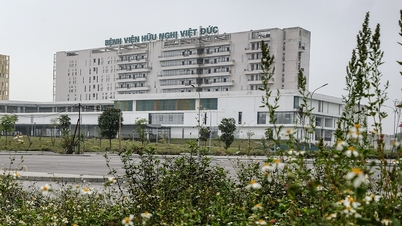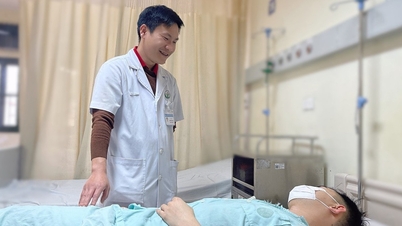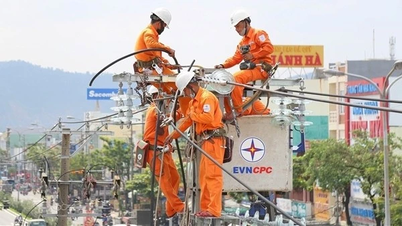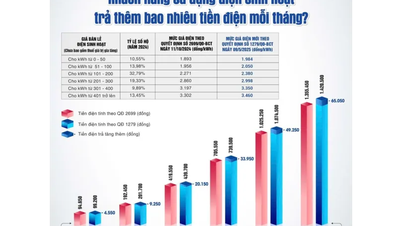A 25-year-old man with a narrowed trachea after a traffic accident has just had a successful tracheal transplant, becoming the first person to receive a trachea transplant from a brain-dead donor.
A 25-year-old man with a narrowed trachea after a traffic accident has just had a successful tracheal transplant, becoming the first person to receive a trachea transplant from a brain-dead donor.
"This is one of the rare tracheal transplants combined with cervical esophageal plastic surgery in world medical literature, and has been successfully performed for the first time in Vietnam," said Dr. Duong Duc Hung, Director of Viet Duc Hospital, on the morning of August 7.
The patient in Thanh Hoa had a traffic accident in July 2022, causing traumatic brain, jaw, chest, liver injuries... The process of cranial resuscitation required assisted breathing, so the doctor opened the patient's trachea (created a hole in the neck for breathing, unable to breathe through the nose as usual).
One month after tracheostomy, the patient was consulted for conservative treatment with dilation and placement of a tracheal stent but failed. This led to difficulty breathing and required permanent tracheostomy.
The patient's father said that his son was breathing through his neck, but still eating and drinking normally, but "when sick, you pray to all directions". The family took him to many places for examination and was prescribed 6 injections into the narrowed trachea. In May 2023, after the 6th injection, the patient had an ulcer, the damage spread to the esophagus, and opened into the trachea.
"At this point, anything the patient eats or drinks goes into the lungs. Not only does the body have to be 'punched' to breathe, but the stomach also has to be opened to pump food," Dr. Hung said, adding that this condition causes the patient and family to be mentally depressed. In the long term, this breathing increases the risk of fibrosis, lung damage, and pneumonia.

When he came to Viet Duc Hospital for examination, the young man's body was exhausted, weighing only 42 kg. He was diagnosed with a 6.5 cm long tracheal injury, but intervention was not possible because the old trachea had been surgically removed, and there was no material to intervene. Tracheal transplantation was the last possible treatment.
After a multidisciplinary consultation, the doctors decided to perform a two-stage surgery on the patient. Stage 1, the patient underwent surgery to cut and reconnect the narrowed cervical esophagus or reconstruct the esophagus using a colon segment. Stage 2, surgery to reconstruct the glottis segment combined with grafting the cervical trachea segment using a brain-dead donor's cervical trachea segment.
After two surgeries performed on April 11 and May 13, the patient was able to breathe, eat normally, and speak, albeit "slurredly". At the end of June, he was discharged from the hospital. At the most recent follow-up visit, the young man had gained 10 kg, and was able to do housework, cook, and take care of his children. The patient needs another surgery to help his voice return to normal.

According to Dr. Hung, tracheal transplantation in general and airway transplantation in particular are still a challenge in surgery. In September 2007, Viet Duc doctors successfully performed the first tracheal autograft for a patient by taking a segment of the patient's renal aorta and grafting it onto their trachea. The number of transplants like this patient in the world can be counted on one hand, less than 10 cases. Thailand has 2 cases that have been followed for up to 20 months. The other cases were all unsuccessful.
"With this case, we are confident that the skills of Vietnamese doctors are not inferior to those of the world," said Dr. Hung, expressing his respect for the brain-dead people whose organs have been donated to revive many lives.
Since the beginning of the year, Viet Duc Hospital has had 16 cases of brain-dead organ donation. One brain-dead organ donor can save at least 4 people, other organs such as heart valves, blood vessels, trachea... are preserved in the tissue bank, which will bring opportunities to many other patients.
Source




![[Photo] General Secretary To Lam meets and expresses gratitude to Vietnam's Belarusian friends](https://vphoto.vietnam.vn/thumb/1200x675/vietnam/resource/IMAGE/2025/5/11/c515ee2054c54a87aa8a7cb520f2fa6e)

![[Photo] General Secretary To Lam arrives in Minsk, begins state visit to Belarus](https://vphoto.vietnam.vn/thumb/1200x675/vietnam/resource/IMAGE/2025/5/11/76602f587468437f8b5b7104495f444d)
![[Photo] General Secretary To Lam concludes visit to Russia, departs for Belarus](https://vphoto.vietnam.vn/thumb/1200x675/vietnam/resource/IMAGE/2025/5/11/0acf1081a95e4b1d9886c67fdafd95ed)
























![[Photo] National Assembly Chairman Tran Thanh Man attends the Party Congress of the Committee for Culture and Social Affairs](https://vphoto.vietnam.vn/thumb/1200x675/vietnam/resource/IMAGE/2025/5/11/f5ed02beb9404bca998a08b34ef255a6)




























































Comment (0)